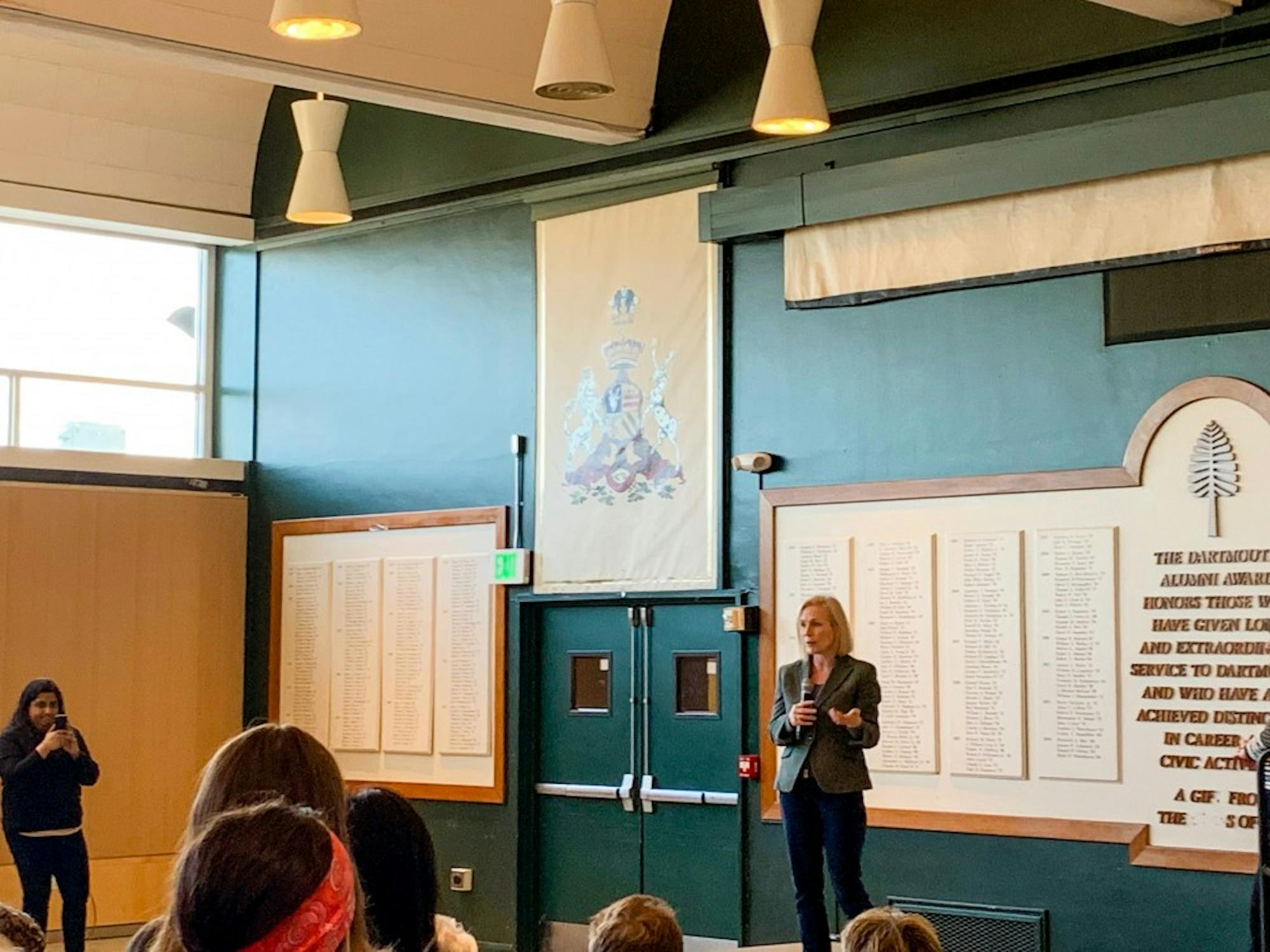“My squash coach is right there!”
With that excited remark, Senator Kirsten Gillibrand ’88 (D-NY) took the stage at her alma mater, becoming the first declared presidential candidate in the 2020 cycle to visit Dartmouth. Gillibrand spoke to a crowd of over 400 students and community members on Saturday in a packed Alumni Hall.
Rep. Annie Kuster ’78 (D-NH) and state senator Martha Hennessey ’76 (D-Hanover) delivered opening remarks at the event. Hennessey reflected briefly on her time at Dartmouth and told students to look around at their peers because “one of them just may one day be president of the United States!” Kuster told students to welcome all presidential candidates to New Hampshire with “radical hospitality” and said that Gillibrand “carries our collective values of honesty, of integrity, of fairness and of compassion for all.”
Gillibrand began her speech by introducing herself and emphasized her previous work on female politicians’ campaigns in New York City. An Asian studies major at Dartmouth, she said she became interested in working in policy when she saw then-First Lady Hillary Clinton speak about human rights in Beijing and asked herself, “Why [am] I [not] invited to that?”
Gillibrand and her husband moved back to her native upstate New York when she decided to run for Congress as a Democrat in 2007 in a “two-to-one Republican” district. Gillibrand beat the incumbent Republican candidate by six points and won her first re-election race by a 24-point margin. She was later appointed to Hillary Clinton’s vacant Senate seat in 2009 and has since consistently won statewide re-election by significant margins.
Gillibrand noted that the Democratic presidential candidate in 2020 will need to “heal” political divides.
“[They’re] going to need to be able to speak to people in red places and purple places about their lives, about their challenges, about their fears and about what are the right solutions for this country,” she said.
Gillibrand said she is a candidate who can do just that.
“Not only did I win that too-red Republican district, but when I became senator for the state, I was able to constantly bring people together, not only winning the red areas and purple areas in the state — as well as the blue areas — but [also] having the highest vote totals in the history of the state,” she said.
According to her, the 2020 presidential race is about “taking on the corruption and greed in Washington that literally decides everything.” She added that “federal lobbyists” for drug companies and the National Rifle Association are examples of money and greed creating “problems in Washington.”
“When they say we can’t have universal background checks, it’s because they want to sell weapons to terrorists on the terrorist watch list, they want to sell a semi-automatic military-style weapon to a teenager in a Walmart,” Gillibrand said. “When you ask the question, ‘Why can’t things get done in Washington?’ I’ll tell you the answer ... It’s not capitalism [and] it’s not corporate America. It’s greed.”
Gillibrand concluded her remarks by telling students to “stand up for what’s right, even when it’s hard — especially when it’s hard.”
After Gillibrand’s 20-minute speech, she took questions from the audience. During the question and answer session, she expressed support for multiple policy proposals popular within the Democratic party.
When asked about how she would address climate change, she said that the “Green New Deal,” a package of environmental and social policies promoted by Rep. Alexandria Ocasio-Cortez (D-NY), is “an excellent framework for a lot of things we need to change.”
“I think addressing global climate change is one of the most urgent crises that’s facing all of humanity,” Gillibrand said, calling for investment in clean water infrastructure and renewable energy sources.
When asked about health care policy, Gillibrand said that in her early Congressional races, she ran on a version of “Medicare for All,” the universal healthcare program backed by Senator Bernie Sanders (I-VT) and progressive Democrats.
“Anyone should be able to buy into Medicare at a price they can afford,” she said, suggesting a rate of four percent of an individual’s income. “That is how you get to [a] single-payer [healthcare system]. That will drive out most of the insurance players.”
Gillibrand mostly refrained from directly attacking President Donald Trump during her remarks until she was asked about her views on immigration policy and Trump’s recent declaration of a national emergency to acquire funding for a border wall. She noted that “the only emergency is in President Trump’s mind.”
“The worst thing [Trump has] done is create fear in this country,” Gillibrand said. “He’s created fear and hatred and a darkness that I’ve never seen before.”
Gillibrand said she supported “comprehensive immigration reform” and an end to the “child separation policy” that has led to migrant children on the border being kept in “a prison.”
Following the public event, Gillibrand met with 20 students from College Democrats who had helped plan the event. When asked about her thoughts on the other candidates in the race, Gillibrand said that her plan was “to be nice to my colleagues.” She also reiterated her support for reproductive freedom, calling it a “basic civil right,” and stated that she will not demonize the press while in office.
College Democrats president Gigi Gunderson ’21 said she was happy with the turnout for the main event. Gunderson estimated that a fifth of the on-campus population RSVP’d for the event, not including community members.
“Getting to see all the energy on campus — so many students and so many different community members — it’s always great,” Gunderson said.
Emily Carter ’19 said that for her, it is important that a candidate presents “a unifying and pragmatic vision.”
“Pushing against what [Trump’s] done is incredibly important, but I think it’s very important that we put forward a vision of our own,” Carter said.
She added that she is worried Gillibrand is listening to a “more identity-based, social media activist group of people.”
“I’m not sure their style of argument is what our country needs in opposition to Trump,” she said.
New London resident Patrick Noble said that the event was “a great opportunity to hear [from] the presidential candidate” and that he would return to Dartmouth for future candidate visits. Patrick Noble said he was concerned about Gillibrand’s ability to “capture [the] votes in the middle of the country that Hillary Clinton could not capture.”
Lenore Noble, also a New London resident, said that Gillibrand “has passion and [is] also engaging” and is looking forward to hearing “more specifics” on her policy proposals, noting that she liked Gillibrand’s ideas about job training programs.
Lily Steckel ’22 said that she learned a lot about Gillibrand as a person and a candidate through the event. In particular, Steckel said she liked Gillibrand’s position on climate change.
“[Gillibrand] said it’s a global emergency,” she said. “I agree with that — I think it’s what the government’s number one priority should be.”





